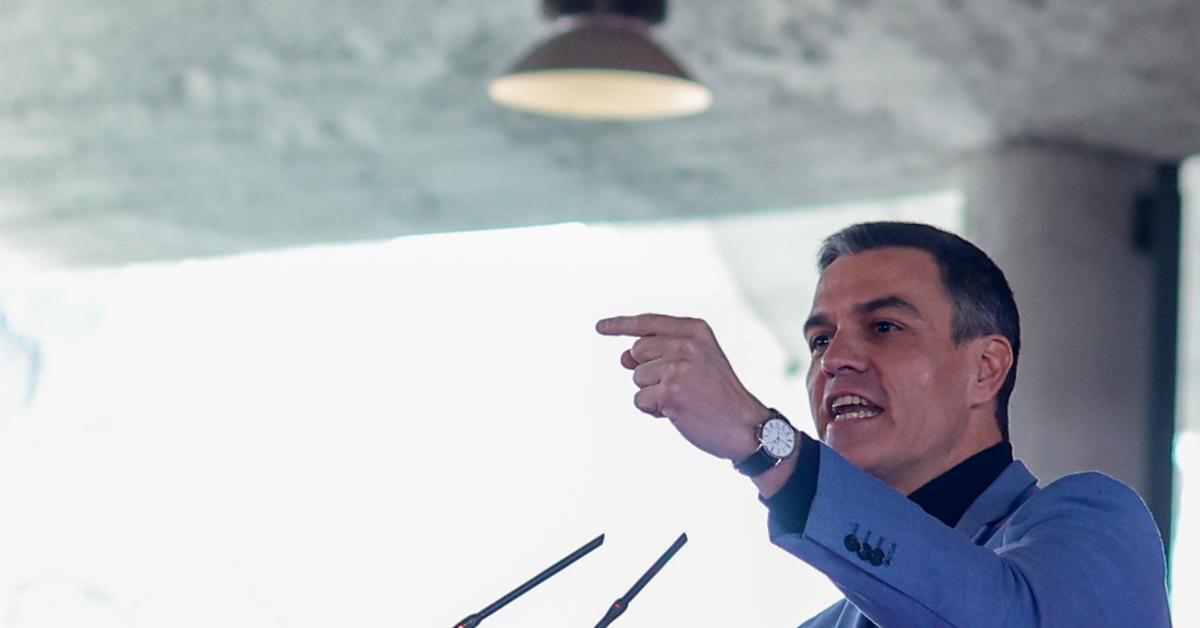
In politics when you say ‘no’, you actually mean ‘maybe’. And when you say ‘maybe’, you really mean ‘yes’. Especially when a party lacks a solid parliamentary majority, is about to approve an amnesty law that is not accepted by a part of its electorate and has just been beaten by its main adversary in a Galician election.
The Government first said ‘no’, then ‘maybe’ and now they maintain that it is a matter of hours before the former Minister of Public Works resigns from his deputy status. It was José Luis Ábalos who hired Koldo García as an advisor in the Ministry of Development. It was José Luis Ábalos who appointed him as a director of Renfe. It was José Luis Ábalos who ignored the warnings of his colleagues about the behavior and goings-on of someone who was his shadow for years. And it was José Luis Ábalos who was the first to declare himself “surprised and disappointed” upon learning of the arrest and subsequent release of the character of the week for allegedly belonging to a biting plot in the sale of masks during the pandemic.
Between “we must wait to know the summary” and “he must assume political responsibility as soon as possible” barely 72 hours have passed, but neither Pedro Sánchez nor the PSOE want to delay any further an issue that they know will not leave the media and parliamentary focus while the that he was number three of the party to remain sitting in his seat. And this is something that they believe the PSOE brand cannot allow a month and a half before the Basque elections and four before the European elections. In terms of corruption, in La Moncloa they seek in this way to “mark the difference with the right”, despite the fact that Ábalos, for the moment, has neither been called to testify as a witness nor is he charged with the alleged collection of commissions in contracts for the supply of masks for which, among others, his closest collaborator is being investigated during the last five years.
However, in an interview on Sexta, the minister defended himself against the accusations this Saturday and explained that he will not resign as a deputy because he has not been judicially accused and because it has been proven that his hiring process was correct. He also said that if the scandal had broken while he was minister, he would not have hesitated to resign, something that for the moment he has ruled out doing as a deputy, despite the fact that the PSOE has redoubled the pressure for him to do so. “Minister and deputy are not the same responsibility. Now it is being proposed that I become politically disqualified for trusting people who disappointed me and that even disqualifies me for life because I am stigmatized,” he added. However, he clarified that if it is a strategy of his party that marks a new ethical line in politics, he will do it. And he said it in these terms: “If I have to make a positive performance to exemplify public life, I am willing.”
The responsability in surveillance
The Government’s analysis is very different from that of Ábalos: “It is not a legal-criminal issue, it is political. If it walks like a duck, quacks like a duck, and swims like a duck, then it is…. duck,” says a minister who, like everyone in the PSOE, knew the personality, background and behavior of Koldo García and blames only the former head of Public Works the responsibility of having kept him by his side for so long, despite the warnings. “He chose him, he did not monitor and he has to assume political responsibility to not drag us all into disaster,” adds the same interlocutor.
Pedro Sánchez has heard this and other opinions in recent days and, although in principle he tried to encapsulate the case and wait until he knew if there was something that directly implicated Ábalos, he has already handed down a sentence. The former minister must leave Congress “sooner rather than later,” say socialist sources. And this “despite the heartbreak that for the president and the vast majority of PSOE officials means doing away with someone who was always loyal to the party, to the cadres and to the militancy and about whom at this moment there is no more certainty.” than that of responsibility in monitoring.” Something that for many is “not little” and for some, “a high price.”
The president, in fact, broke his silence on the scandal this Saturday by stating, in his speech before the Socialist International held in Madrid, that his government “was born from the need to put an end to the corruption of the PP government and has done of exemplarity its flag. An absolute and total exemplarity that does not understand colors.” Hence he said: “I want to reaffirm that this fight has to be relentless, no matter where it comes from and whoever falls. In the face of those who obstructed the action of justice to hinder investigations that affected them, today there is absolute collaboration. Faced with those who expelled the one who denounced, today, the one who made the complaint pays.”
In search of a piece of big game
Sánchez knows that the right is aiming high and has doubts that Ábalos, now without governmental or organizational responsibilities, will serve as a firewall for the scandal. Rather, he suspects that the PP is seeking to collect a big game and points out the Secretary of Organization of the PSOE, Santos Cerdán, for being the one who from the Navarrese clan introduced Koldo García to Madrid and for now being at the center of the conversation public as main negotiator with Junts for the amnesty law. But even so, he has decided that Ábalos hand over the parliamentary certificate, a decision that depends exclusively on the former minister and that will be demanded by the party in the next few hours, according to management sources, “so that the matter is settled before the Monday”.
Ábalos, for his part, defends his innocence and maintains that he has not committed any irregularity, that all the contracts in which he participated were audited by the Court of Accounts without finding any blemish in them and that he does not share the reasons why he has to succumb. to pressure from certain political interests to hand over the minutes. He is sure that the pressure will continue and that behind his resignation, “the right will ask for Cerdán’s resignation and, later, Sánchez’s resignation,” he stated in statements to elDiario.es. In fact, the opposition has already directly asked that the president take responsibility.
The problem, and this is how they understand it in Moncloa and the PSOE, is that the scandal fully affects Sánchez’s commitment to the fight against corruption that encouraged the motion of censure that brought down the Government of Mariano Rajoy in 2018 after the sentencing of the Gürtel. And the Koldo case is the first major corruption scandal that directly affects Sánchez’s Executive, so the voices with whom the president has consulted understand that a difference must be made with the PP in this matter because closing one’s eyes to the obscenity was never good business.
Now there are legions of those who, given the lack of explanations from Sánchez at the time, speculate about the reasons for the president’s decision to dispense with Ábalos in 2021 in the Government and also in the PSOE Organization Secretariat. But La Moncloa insists that it was only due to political reasons and that “those who defamed the former minister were sued and have had to testify in a judicial procedure that is awaiting sentencing.” Nothing was published then about an alleged bribery plot in the purchase of masks, only about the private life of the former minister.
Beyond the Koldo case and its consequences, the Government accuses a situation of clear parliamentary weakness that casts doubt on the duration of the legislature, despite the fact that Sánchez this week, after the overwhelming victory of the PP in the Galician elections, has stated that He intends to go until 2027, also convinced that there will be an amnesty law. Before the end of the semester, the PSOE will have to face two important electoral events in the Parliament of Vitoria and the European Parliament.
In the first, the PP starts from a representation of 6% of the votes that it obtained four years ago and the result of April 21 is not expected to improve the record. However, the right will not miss the opportunity to equate the PSE with Bildu and will try to spread a blanket of suspicion over the more than uncertain possibility that the socialists will support a nationalist government that tries to snatch the first position from the PNV. Ortuzar’s people know that this will not happen and they have guarantees from the socialists to reissue the coalition government and that any doubt in this regard would weaken the support they give to Sánchez in the Congress of Deputies. Even so, others know that “the PP will once again campaign with ETA, with the victims and with whatever is necessary” to win votes even if its electoral strength in Euskadi is irrelevant.
A different issue is the European elections, where the electorate tends to use the ballot as a means of punishing the Government, knowing that the result has little effect on the national scene, beyond the fact that they can determine future strategies. In any case, Sánchez trusts that it will be not the Basques or the Europeans but the Catalans, who will validate the so-called reunion policy if the result of these elections allows Salvador Illa to hold the presidency of the Generalitat, a hypothesis that the socialists gave months ago for a fact and, however, as a consequence of the processing of the amnesty and the erosion of the brand, today it is in doubt.
Source: www.eldiario.es

